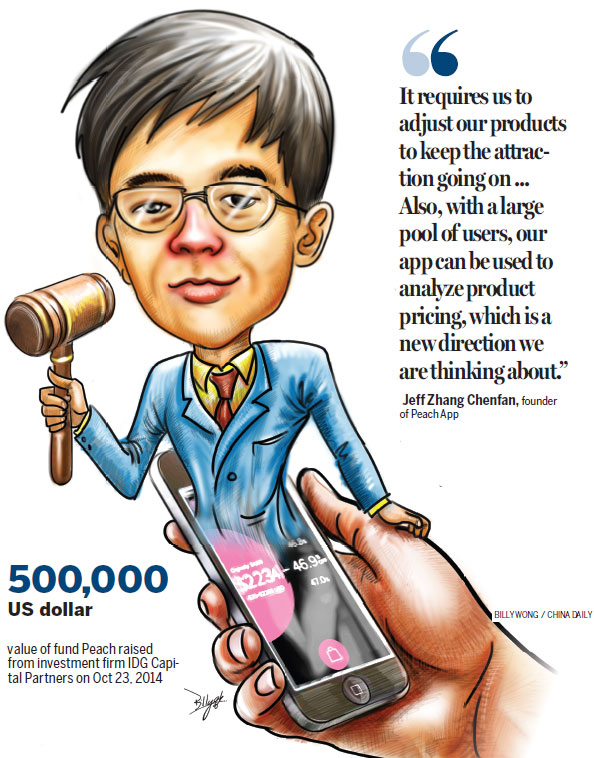You've got nine minutes
Updated: 2015-02-05 09:18
By Yang Yao(HK Edition)
|
|||||||||

Despite the proliferation of online sales websites, Jeff Zhang is confident that there is still room for more.
The confidence of the 26-year-old graduate at UC Berkeley has been manifested in the e-commerce company Peach App he founded.
This nine-minute flash-sale app is designed to offer subscribers competitive prices on a range of top designers' brand, Zhang said.
The app sends a notification to users whenever there is a sale. Users have up to nine minutes after the notification to bid for the item. When the time is up, the highest bidder wins. But the winner would only need to pay the price of the second highest bidder.
This way, "you always pay less than you expect," Zhang said. "We have this slogan: 'Peach, sweeten your life in nine minutes,'" he said.
Established in early 2014, the startup company has already raised $500,000 from IDG Capital Partners.

"It is a platform best described as a Dutch auction website. We started by focusing on local transactions," said Zhang.
The idea of starting such a company came from his experience of trying to sell his laptop at campus.
Zhang came to the US from Xiamen, Fujian province, in 2009 and attended UC Berkeley in 2011. When he was a junior, he tried to sell his old laptop and used the money to afford an upgrade.
"I tried a lot of places to sell it, eBay, Craiglist, school bbs, but because I set the price too high, no one wanted it," he said.
He decided to try a different way. He posted a message saying that he would drop the price by $10 every day until someone would take it.
"Finally I sold my laptop at the price of $680, and I thought this method is a great idea. Why wouldn't I make a website to do that for vendors?" he said.
After graduating in 2013, Zhang was looking for a job while making plans for the next few years.
Soon after he graduated, he was offered a job with a two-year contract in Washington DC. But he turned it down in order to pursue his dream.
Zhang and two other Chinese mainland students Duan Yan and Chen Xi tested the idea of a new bidding site in the Berkeley campus.
They launched an iPhone app called Sellegit in early 2013 and only targeted users within the Berkeley campus. In seven months, they have signed up 4,000 registered users.
"The original idea of the product is an automatic pricing application for second hand items, but it lacks user density as we have already had many mature competitors in this field. So we decided to change the model into e-commerce instead," Zhang said.
In December 2013, they came to the SkyDeck office, UC Berkeley's best incubator, where they met and talked with many startup veterans.
"Frankly, when I first had this idea, I did not know anything about market research or business. I didn't know anything about my business model, target market, strategies, etc. We learned a lot from others. Now we have clear business model, and we are building and improving product for that target customer group," he said.
On Oct 23 last year, Peach succeeded in raising $500,000 from IDG Capital Partners, an investment firm with over $2.5 billion under management. It has invested in Baidu, Tencent, Ctrip and other e-commerce companies on the Chinese mainland.
"We tried to create a new fun way to shop," Zhang explained.
The "fun" part is the final minute of blind bidding at each nine-minute auction round, in which a brand-name product is made available by several large Hong Kong retailers is offered to the highest bidder.
In the first eight minutes of the round, the bidding is open with the offer of each bidder clearly listed. But in the last minute no such information is made available anymore.
"That's part of the excitement," Zhang said. There's also a practical side, he said, as the final blind bidding discourages people from bidding from multiple accounts, because they could end up bidding against themselves.
What makes Peach stand out among such competitors as eBay and Tophatter, is that the winner only has to pay the second highest bid, Zhang said.
Within two months, the app signed up 15,000 users, with a sales amounting to $150,000 yielding a five percent profit. The company shipped over 500 packages to successful bidders in 12 different countries.
The biggest problem young entrepreneurs face now is building a credible customer base.
People may be signing up just out of curiosity. In the long run, they may just go back to the old ways of shopping at department stores that are offering discounts all year round.
"It requires us to adjust our products to keep the attraction going on," Zhang said. "Also, with a large pool of users, our app can be used to analyze product pricing, which is a new direction we are thinking about," he said.
The app hasn't had a Chinese version yet.
Gao Hanmo, another mainland entrepreneur in the Silicon Valley said that the Chinese e-commerce marketplace is largely dominated by the big players, and if a startup cannot amass a large enough base in a short time, it's chances of survival is going to be slim.
"Overseas Chinese entrepreneurs who have the vision of tapping the Chinese market, they need to first lay a solid foundation in the Silicon Valley and open the mainland market when the business is mature and ready," Gao said.
yangyao@chinadaily.com.cn
(HK Edition 02/05/2015 page9)